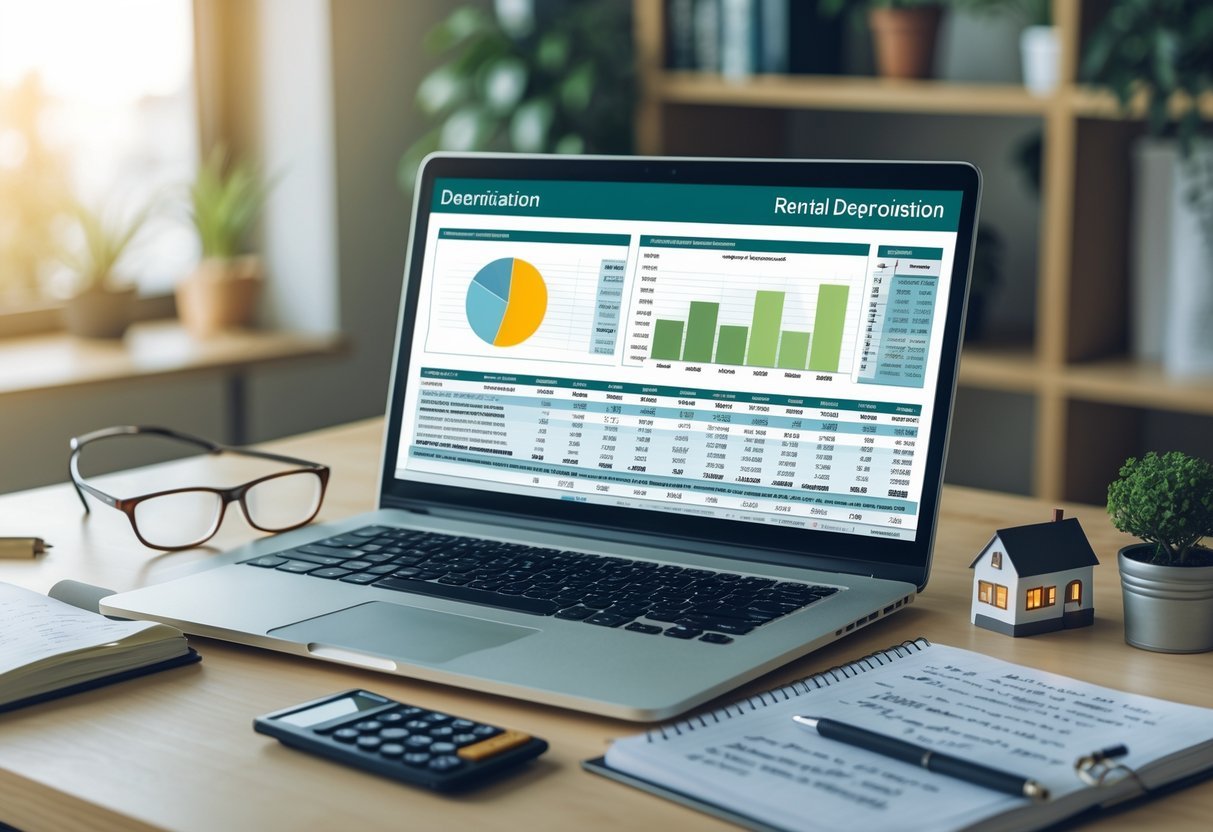Owning rental property can significantly reduce your tax burden through various deductions. Landlords can deduct mortgage interest, property taxes, maintenance costs, insurance premiums, and depreciation from their rental income to lower their taxable income. These deductions can help maximize your return on investment while staying compliant with IRS regulations.
Smart property owners take advantage of rental property tax deductions to increase their profits and build long-term wealth. Whether you own a single rental unit or multiple properties, understanding these tax benefits is essential for successful real estate investing.
Proper documentation and timing of your deductible expenses are crucial for maximizing tax savings. With careful planning and accurate record-keeping, you can ensure you’re claiming every eligible deduction while maintaining compliance with tax laws.
Key Takeaways
- Property owners can reduce their tax liability through numerous deductions including operating expenses, repairs, and depreciation
- Accurate documentation and timely recording of expenses are essential for claiming maximum tax benefits
- Strategic tax planning and regular expense tracking help optimize rental property investment returns to help scale up a real estate portfolio
Understanding Rental Property Tax Deductions

Tax deductions for rental properties can significantly reduce your taxable rental income when properly documented and claimed.
Classification of Rental Properties
The IRS categorizes rental properties based on their usage and income-generating purpose. Your property qualifies as a rental if you rent it for more than 14 days per year.
Properties can be residential or commercial, and each type has specific tax implications and deduction rules.
If you use the property personally while also renting it out, you must carefully track the days of personal use versus rental use. This affects which expenses you can deduct and in what proportion.
Fundamental Principles of Rental Property Taxation
You can claim mortgage interest, property taxes, and maintenance costs as standard deductions on your rental property.
Depreciation deductions allow you to recover the cost of your property over 27.5 years for residential properties or 39 years for commercial buildings.
Your rental activities must show a profit motive. The IRS may classify consistent losses as a hobby rather than a business, limiting your deduction options.
Keep detailed records of all income and expenses. Document every repair, maintenance cost, and improvement with receipts and invoices.
Common Deductible Expenses
Tax deductions for rental properties can significantly reduce your taxable rental income when properly documented and claimed.
Mortgage Interest
Mortgage interest payments represent one of the largest deductible expenses for rental property owners. You can deduct interest paid on loans used to buy, build, or improve your rental property.
This deduction applies to both first mortgages and refinanced loans. If you use a home equity loan on your rental property, the interest may also be deductible if the funds were used for property-related purposes.
Keep detailed records of your annual mortgage statements, as these document the exact amount of interest paid during the tax year.
Property Taxes
You can deduct property taxes paid on your rental property. This includes annual real estate taxes assessed by your local government.
Special assessments for local benefits that increase property value, such as new sidewalks or street improvements, must be added to your property’s cost basis rather than deducted.
Remember to save your property tax bills and proof of payment for your records.
Maintenance and Repairs
Regular maintenance and necessary repairs are fully deductible in the year you pay for them. This includes:
- Painting and wallpapering
- Fixing leaks and plumbing issues
- Repairing broken windows or doors
- HVAC system maintenance
- Pest control services
Keep receipts and document the nature of each repair. Note that major improvements must be depreciated rather than deducted immediately.
Utilities
Utilities you pay for your rental property qualify as deductible expenses. These include:
- Electricity
- Gas
- Water and sewer
- Garbage collection
- Internet and cable (if provided to tenants)
If you manage multiple units, maintain separate utility records for each property.
Save monthly statements and payment records to support your deductions during tax time.
Depreciation of Rental Property
Rental property depreciation allows you to deduct the cost of your investment property over time, reducing your taxable rental income. The IRS recognizes that properties lose value through wear and tear, making this a valuable tax benefit.
Calculating Depreciation
You can begin taking depreciation deductions when your rental property is ready and available to rent. The IRS requires you to depreciate residential rental properties over 27.5 years using the Modified Accelerated Cost Recovery System (MACRS).
To calculate annual depreciation:
- Determine your property’s cost basis (purchase price + improvements)
- Subtract the land value (land cannot be depreciated)
- Divide the remaining value by 27.5
The bonus depreciation deduction in 2024 allows you to claim 60% of qualifying property improvements in the first year.
Depreciation Recapture
When you sell your rental property, the IRS will want some of those depreciation deductions back through a process called depreciation recapture. The recapture tax rate can be up to 25% on the total amount of depreciation claimed.
You must pay depreciation recapture even if you didn’t claim depreciation deductions during your ownership period. The IRS assumes you took the deductions, making it crucial to claim depreciation each year you’re eligible.
Keep detailed records of your depreciation calculations and claims to accurately report both yearly deductions and eventual recapture amounts.
Travel Expenses
You can deduct travel expenses when visiting your rental properties for business purposes, including transportation, lodging, and meals.
Local Travel
You can deduct mileage costs when driving to your rental properties for maintenance, repairs, rent collection, or property inspections. The IRS standard mileage rate applies to these trips.
Keep detailed records of each trip, including the date, destination, purpose, and miles driven. A mileage tracking app can help document these expenses.
Gas, parking fees, and tolls related to property visits are also tax-deductible when properly documented.
Long-Distance Travel
Overnight travel expenses are deductible when you travel away from your tax home to manage rental properties. This includes airfare, hotel stays, rental cars, and 50% of meal costs.
Your trip must have a clear business purpose. If you spend over 50% of your time on rental activities, transportation costs are fully deductible.
Save all receipts and document the business activities performed during your trip. Include meeting notes, repair invoices, or property inspection reports to support your deductions.
Mixed personal and business trips require allocating expenses based on time spent on rental activities versus personal activities.
Operating Expenses

Operating expenses for rental properties encompass regular costs required to maintain and manage your investment property. These essential expenditures directly impact your net rental income and tax obligations.
Insurance Premiums
Insurance coverage for rental properties serves as a crucial tax deduction. You can deduct premiums for landlord insurance policies that protect your property and rental business.
Basic landlord policies typically cover structural damage, liability protection, and loss of rental income.
Additional coverage options include:
- Natural disaster protection
- Vandalism coverage
- Personal property insurance for furnished units
- Rent default insurance
Consider bundling multiple properties under one policy to reduce premium costs while maintaining comprehensive coverage.
Advertising Costs
Marketing expenses to find quality tenants qualify as deductible operating costs. You can write off expenses for:
- Online rental listing services
- Social media advertising
- Professional photography
- Virtual tour creation
- Print advertisements
- “For Rent” signs
Track all promotional spending with detailed receipts and digital records. Digital marketing often provides better ROI compared to traditional advertising methods.
Professional Services
You can deduct fees paid to qualified professionals who help manage your rental business:
Property management companies typically charge 8-12% of monthly rent for their services. These fees are fully deductible.
Legal and accounting services that qualify include:
- Lease preparation
- Tenant screening
- Tax preparation
- Bookkeeping
- Legal consultations
- Eviction proceedings
Keep detailed invoices from all service providers to substantiate your deductions during tax season.
Pass-Through Tax Deductions
The Tax Cuts and Jobs Act of 2017 created significant tax advantages for rental property owners through qualified business income deductions that can reduce your tax burden substantially.
Qualified Business Income Deduction
You can deduct up to 20% of your net rental income from your taxes if your rental activities qualify as a business. This deduction applies to income from partnerships, S corporations, sole proprietorships, and rental properties.
To qualify, you must demonstrate that your rental activities constitute a legitimate business operation. This typically means maintaining proper records, dedicating regular time to property management, and following standard business practices.
The deduction phases out for high-income taxpayers. Income thresholds adjust annually for inflation, so check current IRS guidelines for specific limits.
You must report all rental income on your tax return, even if you plan to claim the pass-through deduction.
Key Requirements:
- Active participation in rental business
- Proper documentation and bookkeeping
- Regular and continuous rental activity
- Income within qualifying thresholds
Tax Deduction Limitations and Exceptions
The IRS imposes specific restrictions on rental property deductions to prevent tax abuse and ensure fair reporting of losses. Understanding these limits helps you maximize allowable deductions while staying compliant.
Passive Activity Loss Limitations
Rental property losses can only offset passive income from other rental properties or investments. These losses cannot reduce your regular income from wages or self-employment.
If you actively participate in managing your rental property, you may qualify to deduct up to $25,000 in losses against non-passive income. This exception applies when your modified adjusted gross income is under $100,000.
The deduction phases out between $100,000 and $150,000 of modified adjusted gross income. Above $150,000, you cannot use rental losses to offset non-passive income.
At-Risk Rules
The at-risk rules limit your deductible losses to the amount you have financially invested in the rental property. This includes:
- Cash and property contributions
- Mortgage amounts you’re personally liable for
- Qualified non-recourse financing from banks or similar lenders
You cannot deduct losses beyond your at-risk amount, even if you incurred larger actual losses. Any disallowed losses carry forward to future tax years when you increase your at-risk amount.
Frequently Asked Questions
Rental property owners have specific IRS guidelines and tax requirements to follow when claiming deductions. Strategic documentation and knowledge of eligible expenses helps maximize tax benefits.
What expenses are tax deductible for a rental property?
Rental property tax deductions include mortgage interest, property taxes, repairs, utilities, insurance, and property management fees.
You can deduct travel expenses related to property management and maintenance, including mileage for property visits.
Depreciation of the building structure and capital improvements also qualify as legitimate tax deductions.
How can I maximize my tax return on a rental property?
Keep detailed records of all property-related expenses throughout the year with receipts and invoices.
Track your mileage and time spent managing the property to claim appropriate deductions.
Consider timing major repairs and improvements strategically across tax years to optimize deduction benefits.
Is losing money on a rental property considered a tax deduction?
Rental property losses can offset other income through passive activity loss rules, subject to income limitations.
You must actively participate in property management to qualify for loss deductions up to $25,000 annually.
Can I take the standard deduction if I have rental property?
You can claim both the standard deduction and rental property expenses since rental deductions are reported on Schedule E.
Rental property deductions do not affect your decision to itemize or take the standard deduction on your personal return.
What are the IRS rules regarding deductions for rental properties?
Expenses must be ordinary and necessary for managing, maintaining, or operating the rental property.
Personal use of the property may limit deductible expenses based on the ratio of rental to personal days.
You must allocate expenses between rental and personal use if the property serves both purposes.
Are there any specific IRS forms needed for tax deductions on rental property?
Schedule E (Form 1040) reports rental income and deductible expenses for residential properties.
Form 4562 documents depreciation and amortization deductions for rental properties.
Form 8582 calculates allowable passive activity losses if applicable to your situation.




